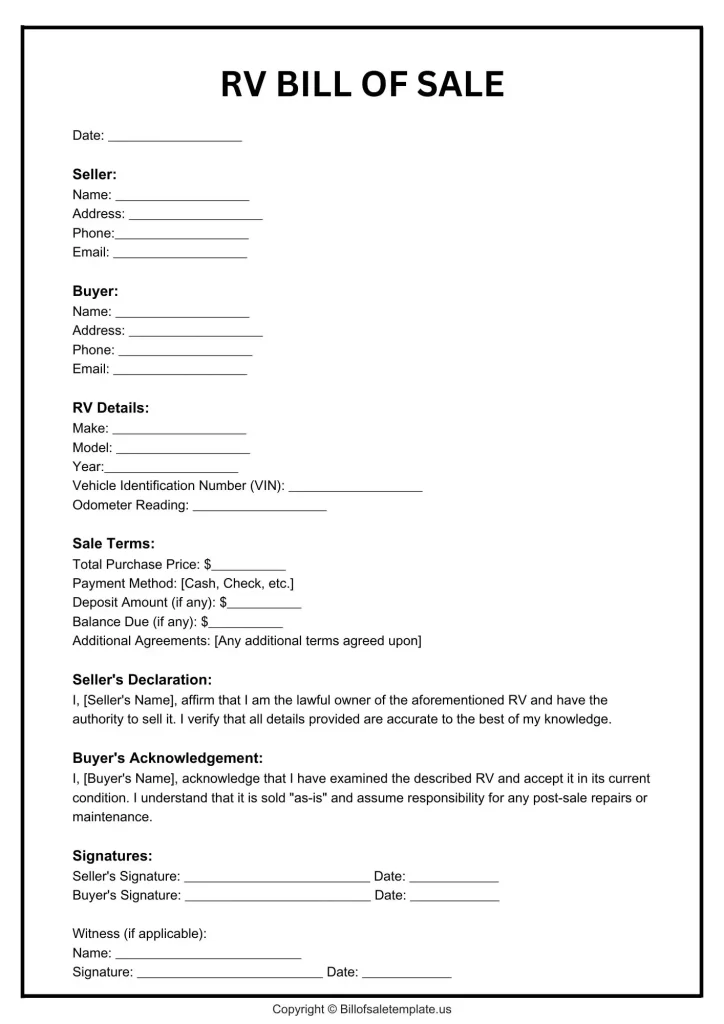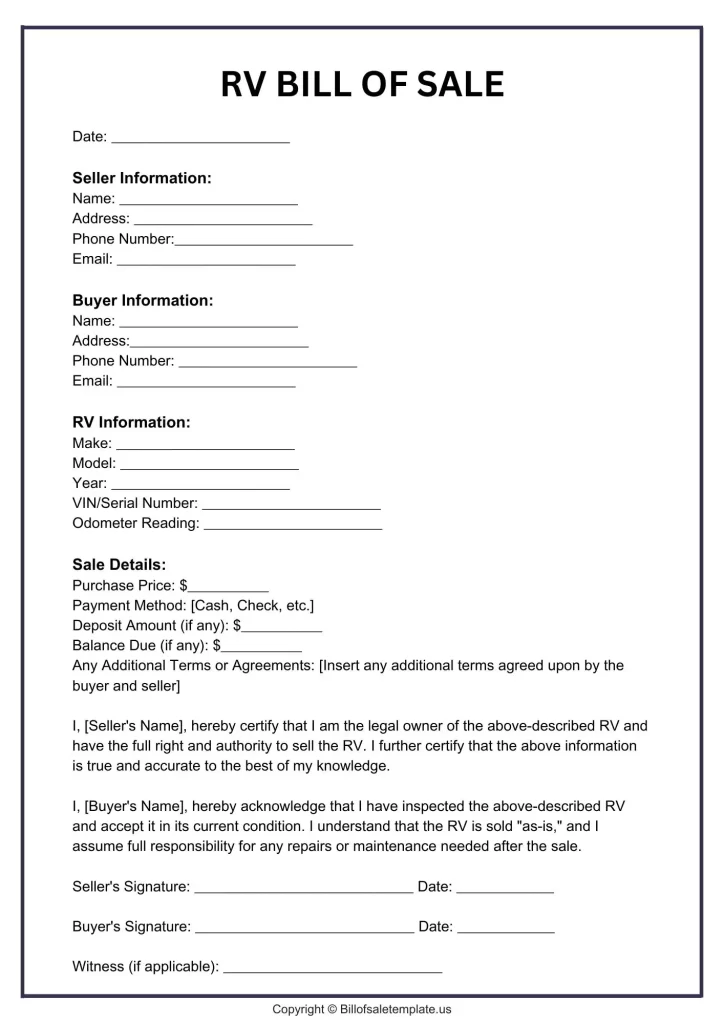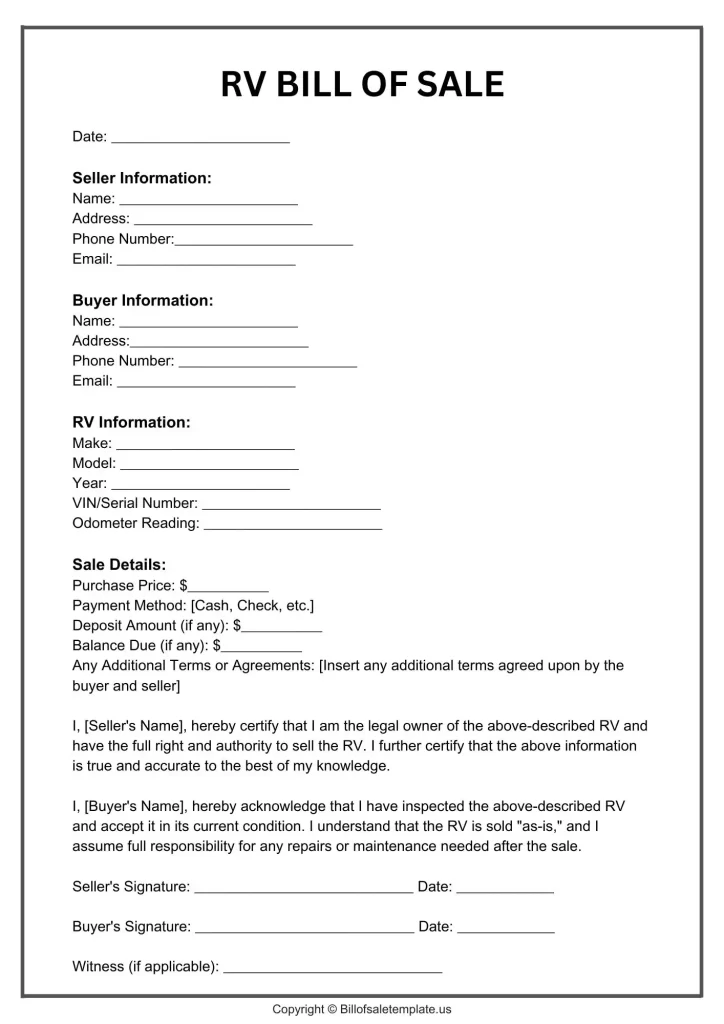An RV (Recreational Vehicle) Bill of Sale is a legal document that records the sale and transfer of ownership of a recreational vehicle from a seller to a buyer. This document ensures that both parties have a clear and formal agreement regarding the terms of the sale, providing legal protection and a record of the transaction.
Free Printable RV Bill of Sale Template

Here are the key elements typically included in an RV Bill of Sale:
Key Elements of an RV Bill of Sale
- Buyer and Seller Information: Full names, addresses, and contact details of the buyer and seller.
- RV Description: Detailed information about the RV, including:
- Make
- Model
- Year
- Vehicle Identification Number (VIN)
- Odometer reading
- License plate number (if applicable)
- Additional features or specifications
- Sale Price: The agreed-upon sale price of the RV.
- Date of Sale: The date when the sale takes place.
- Payment Terms: Details on how the payment will be made (e.g., lump sum, installments).
- Warranties and Disclosures: Any warranties provided by the seller or disclosures about the RV’s condition.
- Signatures: Signatures of both the buyer and the seller to confirm their agreement to the terms outlined in the document.
- Witnesses/Notarization (if required): Signatures of witnesses or notarization, if required by state law or for additional legal protection.
Uses and Importance
- Legal Proof: Provides legal proof of the transaction and ownership transfer.
- Protection for Both Parties: Protects both the buyer and seller by clearly outlining the terms of the sale.
- Conflict Resolution: Serves as a reference document to resolve any disputes regarding the sale.
Legal Considerations
- State Laws: The requirements for an RV Bill of Sale can vary by state, so it’s important to comply with local laws and regulations.
- Title Transfer: Along with the Bill of Sale, the RV title must be transferred to the new owner. This often requires additional paperwork with the state’s Department of Motor Vehicles (DMV).
RV Bill of Sale as is no warranty
The requirement for notarization of an RV (Recreational Vehicle) Bill of Sale varies by state and is not necessarily dependent on whether a warranty is included. Here are some key considerations:
State Requirements:
- Varies by State: Some states may require a notarized Bill of Sale for an RV, regardless of the warranty status, to ensure the legality and authenticity of the transaction. Examples of states that may require notarization for vehicle transactions include Ohio, Louisiana, and Nebraska.
- DMV Requirements: Check with your state’s Department of Motor Vehicles (DMV) to determine if notarization is required. DMV websites often provide specific guidelines for the sale and transfer of RVs.
No Warranty Sales:
- As-Is Sales: If the RV is being sold “as-is” with no warranty, the primary function of the Bill of Sale is to document the transaction and transfer of ownership. Notarization in this case serves to add an extra layer of legal validation, which can be particularly useful in preventing future disputes.
Benefits of Notarization:
- Legal Protection: Notarization provides a verified legal document that can be crucial in case of disputes over the sale.
- Proof of Authenticity: It ensures that both parties are who they claim to be and that they have willingly signed the document.
Example of State-Specific Guidelines:
- California: Notarization is not typically required for a BOS for an RV.
- Texas: Generally does not require notarization for an RV BOS.
- Florida: A notarized Bill of Sale can be beneficial but is not required by law.
While notarization may not be universally required for an RV BOS, it can provide added legal protection and authenticity to the document. Always check with your local DMV or relevant state authorities to determine specific requirements in your state.

Ted Cruz is the founder and driving force behind BillofSaleTemplate.us, a comprehensive resource for free bill of sale templates tailored to meet a variety of needs. With a keen understanding of the importance of accurate and legally sound documentation, Ted has dedicated his expertise to providing accessible and user-friendly templates for all types of transactions, from vehicle sales to personal property exchanges.
Recognizing the diverse legal requirements across different states, Ted has meticulously crafted state-specific bill of sale templates to ensure compliance and ease of use for users nationwide. His commitment to simplifying the process of creating reliable and legally binding documents has made BillofSaleTemplate.us a trusted platform for individuals and businesses alike.
![Free Bill of Sale Template PDF, Word [United States]](https://billofsaletemplate.us/wordpress/wp-content/uploads/2024/06/bill-of-sale-Logo-1-189x74.png)

